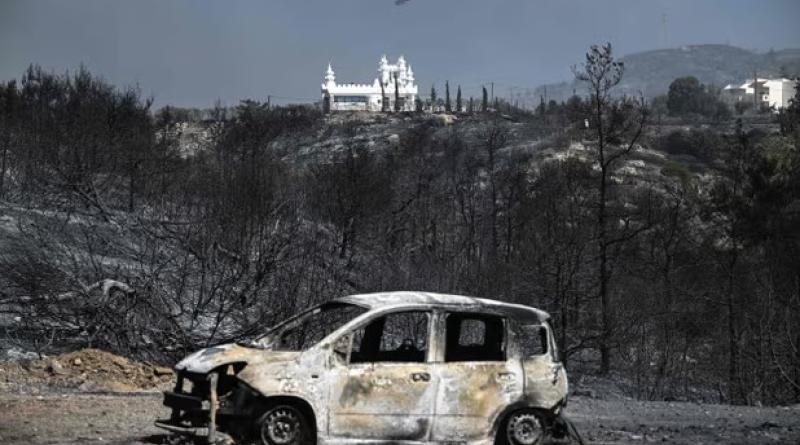Deadly global heatwaves undeniably result of climate crisis, scientists show

Analysis makes it clear human-caused global heating is destroying lives with worse to come without sharp emissions cuts
The human-caused climate crisis is undeniably to blame for the deadly heatwaves that have struck Europe and the US in recent weeks, scientists have shown.
Both would have been virtually impossible without the global heating driven by burning fossil fuels, their analysis found. Another searing heatwave, in China, was made 50 times more likely by the climate crisis.
The results make it crystal clear that human-caused global heating is already destroying lives and livelihoods across the world, making the need to cut emissions ever more urgent. Such brutal heatwaves are no longer rare, the scientists said, and will worsen as emissions continue to rise. If the world heats by 2C, they will happen every two to five years.
A report by leading climate scientists in March endorsed by the world’s governments, said: “There is a rapidly closing window of opportunity to secure a livable and sustainable future for all.” The latest analysis demonstrated how rapidly that window is closing.
Earlier in July, temperature records were shattered in many places in southern Europe, the western US and Mexico and China, bringing heat-related deaths and wildfires. The first week of July saw the hottest global temperatures in history. The researchers found that greenhouse gas emissions made the heatwaves 2.5C hotter in Europe, 2C hotter in North America, and 1C hotter in China than if humankind had not changed the global atmosphere.

“Such heatwaves are no longer rare and the most important thing is, these extremes kill people, particularly destroying the lives and livelihoods of the most vulnerable,” said Dr Friederike Otto at Imperial College London, UK, who was part of the analysis team.
“Politicians often claim that they care about normal people and poor people,” she said. “If we did value people, it’s pretty obvious what we need to do. I don’t think stronger evidence has ever been presented for a scientific question.”
Otto said it was “absolutely critical” that governments agree to phase out fossil fuels at the UN climate summit Cop28, which opens on 30 November. The summit president, Sultan Al Jaber, is also the CEO of the state-run oil and gas company of the host nation, the United Arab Emirates. “We still have time to secure a safe and healthy future,” said Otto. “If we do not, tens of thousands of people will keep dying from heat-related causes each year.”
Julie Arrighi, director of the Red Cross Red Crescent Climate Centre, said: “Extreme heat is deadly and rapidly on the rise.” She said it was crucial for countries to act to protect people from heat. In the UK last week, the government’s adaptation plan was called “very weak” by experts. On Monday, the prime minister, Rishi Sunak, indicated he may delay or abandon some green policies under pressure from the right wing of his party.
A similar series of heatwaves across the northern hemisphere in 2018 was also judged impossible without global heating. More than 500 extreme weather events have now been analysed by scientists, who found 93% of heatwaves and 68% of droughts had been made more severe and/or more likely by human-caused emissions.
More than 61,000 people died in the European heatwaves of 2022, according to a recent study, including more than 3,000 in the UK. Another study estimated that millions have died from heat across the world in the past three decades because of the climate crisis. However, global progress to cut the burning of fossil fuels remains very slow, with the G20 the latest group to have such plans stymied by the opposition of fossil fuel states led by Saudi Arabia on Saturday.
The new analysis by the World Weather Attribution group used peer-reviewed methods to quantify the impact of the climate crisis on the recent heatwaves. They used weather data up to 18 July and computer models to compare today’s climate, with 1.2C of global heating, with the cooler climate of the late 1800s.
The study found the heatwaves in Europe and the US were, as an absolute minimum, made 950 and 4,400 times more likely by global heating – making it virtually certain that they were the result of human-caused emissions. In China, the heatwave was made 50 times more likely.
In today’s hotter climate, these heatwaves are expected about every five years in China, every 10 years in Europe and 15 years in the US, but will happen ever more frequently as emissions continue to rise. The growing El Niño, a natural climate phenomenon, probably added a little heat to the heatwaves, the scientists said, but global heating from burning fossil fuels was the main reason for their severity.
Gareth Redmond-King, at the Energy and Climate Intelligence Unit in the UK, said: “As we keep burning fossil fuels, we fuel ever worse climate impacts. It won’t stop until we cut emissions to net zero. Politicians who attempt to delay [climate] measures are locking in more of these extremes.”
Helen Clarkson, CEO of the Climate Group, which works with 500 multinational companies, said: “The UK government rowing back on green policies is both astonishing, at a time when the impacts of climate change are getting worse, and economically irresponsible. Previous moves to scrap green policies [on home insulation] added at least £2.5bn to the UK’s energy bills during the cost of living crisis.”
Photograph: Spyros Bakalis/AFP/Getty Images - A burnt car near the village of Kiotari, on the Greek island of Rhodes on Sunday





